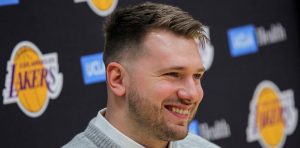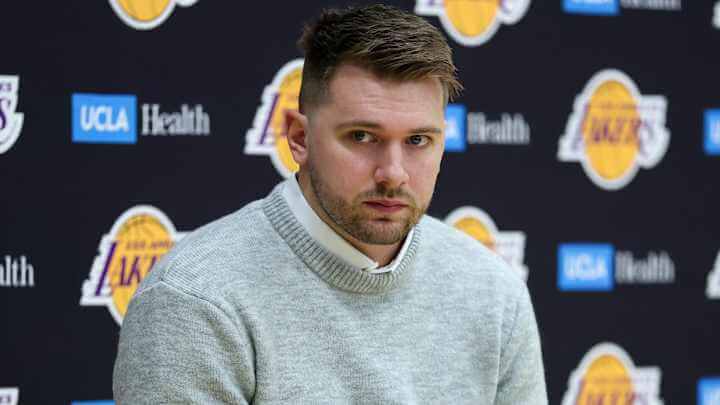World News
The Fallout of the Luka Dončić Trade: Nico Harrison’s Miscalculation and the Mavericks’ Turmoil
The Controversial Trade That Shook Dallas
In a move that sent shockwaves through the NBA, the Dallas Mavericks traded their franchise cornerstone, Luka Dončić, to the Los Angeles Lakers in exchange for Anthony Davis. This decision, made by Mavericks General Manager Nico Harrison, was met with immediate and intense backlash from fans and analysts alike. Dončić, a five-time All-Star and the face of the Mavericks, had led the team to significant playoff success, including an NBA Finals appearance. The trade was not just a basketball transaction; it was a seismic shift that disrupted the emotional bond between the team and its supporters.
Harrison’s rationale centered on building a team with a defensive identity, believing that a lineup featuring Kyrie Irving, Klay Thompson, P.J. Washington, Anthony Davis, and Dereck Lively could contend for a championship. However, this vision quickly unraveled due to a series of injuries. Davis was injured in his debut game, Irving suffered a season-ending ACL tear, and Lively missed significant time with a stress fracture. The Mavericks’ season spiraled, culminating in a 10th-place finish and an early exit in the play-in tournament.

Harrison’s Admission and the Fanbase’s Outrage
In the aftermath of the disappointing season, Harrison held a press conference where he made a startling admission: he underestimated the depth of the fans’ attachment to Dončić. “I did know Luka was important to the fan base. I didn’t quite know to what level,” he confessed. This statement only fueled the anger of a fanbase already incensed by the trade and the team’s poor performance. Chants of “Fire Nico” echoed through the American Airlines Center, and mobile billboards calling for his dismissal circulated around Dallas.
Harrison attempted to defend his decision by emphasizing the potential of the new roster, stating that a healthy lineup could have silenced critics through winning. However, this defense fell flat as the reality of the team’s struggles was undeniable. The disconnect between the front office’s vision and the fans’ expectations highlighted a significant misalignment within the organization.
The Emotional Return of Luka Dončić
Adding to the drama, Dončić’s return to Dallas as a Laker was a poignant moment. The Mavericks honored him with a tribute video, bringing the star to tears before he delivered a 45-point performance to lead the Lakers to victory over his former team. The fans’ reception was overwhelmingly positive for Dončić and equally hostile toward the Mavericks’ management. This game served as a stark reminder of what the franchise had lost and the emotional toll the trade had taken on the community.
Dončić himself expressed his heartbreak over the trade, revealing that he threw his phone in frustration upon hearing the news. His candidness resonated with fans who felt betrayed by the organization’s decision. The emotional weight of his departure and the subsequent struggles of the team underscored the magnitude of the miscalculation by the Mavericks’ leadership.

Internal Strife and Public Relations Missteps
The trade and its fallout exposed deeper issues within the Mavericks’ organization. Reports of internal dysfunction and a lack of transparency plagued the team. A closed-door meeting between Harrison and select reporters, held without cameras or recordings, was criticized for its secrecy. Additionally, leaks suggesting concerns about Dončić’s conditioning and commitment further damaged the team’s credibility. Dončić and his family publicly refuted these claims, accusing the organization of tarnishing his reputation to justify the trade.
Team governor Patrick Dumont’s comments about wanting players who “worked really hard, every day” were interpreted by some as veiled criticisms of Dončić, adding fuel to the fire. The organization’s attempts to control the narrative only deepened the rift between the team and its supporters. The lack of accountability and perceived scapegoating eroded trust and highlighted a need for introspection and change within the franchise.
The Path Forward: Rebuilding Trust and Competitiveness
Looking ahead, the Mavericks face the daunting task of rebuilding both their roster and their relationship with the fanbase. Harrison remains confident in his vision, asserting that the team will be championship contenders in the upcoming season. However, this optimism is met with skepticism from a community still reeling from the loss of its beloved star. The organization must navigate the complexities of repairing its image, fostering a cohesive team culture, and delivering results on the court.
The situation serves as a cautionary tale about the importance of understanding and valuing the emotional connections between a team and its fans. Decisions made in pursuit of strategic goals must also consider the intangible elements that contribute to a franchise’s identity and success. For the Mavericks, the road to redemption will require transparency, humility, and a renewed commitment to aligning organizational actions with the values and expectations of their supporters.
From toplineapparelstore

